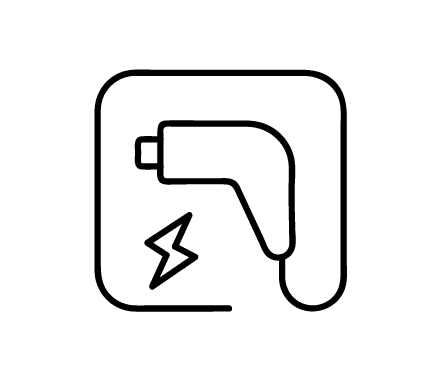
Welcome to the Knowledge Hub

Driving An EV
SIMPLE STEPS TO HELP YOU GET GOING
Electric vehicles don’t just reduce emissions; they’re smooth, quiet, and surprisingly fun to drive. With just two pedals, instant torque, and no gears to think about, getting behind the wheel feels refreshingly simple.
EVs also handle brilliantly, thanks to a low centre of gravity and balanced design, with most batteries tucked under the floor. Inside, you’ll find modern tech, smart connectivity and a calm, focused driving experience.
This guide covers the essentials — from starting up to adjusting your seat — so you can hit the road with ease. For model-specific instructions, check your Vehicle Information Page for the digital manual.
EV ESSENTIALS: GETTING STARTED

LOCKING & UNLOCKING
Lock and unlock your EV using the key fob, just like a petrol or diesel car. Many vehicles also unlock automatically when you approach with the key nearby.

STARTING THE VEHICLE
With your foot on the brake, press the start/stop button. Most EVs are completely silent when ready, just look for a “Ready” symbol on the dashboard display.

DRIVING AN EV
Select Drive (D) or Reverse (R) using the gear selector. This is usually a manual lever behind the steering wheel, or in the central console. EVs accelerate smoothly and instantly so make sure you're in the right mode before easing on the accelerator. There’s no engine noise, just a quiet, effortless drive.

TURNING OFF THE VEHICLE
Press the start/stop button again, and the car will power down. You might have to depress the break at the same time on some models. Most EVs will also turn off automatically when you lock the vehicle.
GET COMFORTABLE: KEY ADJUSTMENTS

SEATS & MIRRORS
Use the manual levers or electronic controls on the driver’s seat or driver door to get set up. Adjust your side and rear-view mirrors for full visibility before setting off.

LIGHTS & CHILDLOCK
Headlights usually default to auto mode in an EV, but you can toggle manually if needed. You’ll find child lock settings on the door or via the system settings on the infotainment screen.

REGENERATIVE BRAKING
Regenerative braking slows the car when you lift off the accelerator, saving energy and reducing brake wear. You can adjust the level in the infotainment settings, and some cars have paddles so you can change it while driving. Go stronger in traffic, lighter on the motorway.

DRIVING MODES
Driving modes help you adapt to different journeys. Eco saves battery by reducing power and climate use. Normal offers a balanced everyday drive. Sport gives sharper acceleration for a more responsive feel.

CAR CONFIGURATION AND TECH

CONNECT YOUR PHONE
Pair your smartphone using Bluetooth or Apple CarPlay / Android Auto (if available). Most Europcar EVs display prompts on the touchscreen when first starting the car.

CHARGE YOUR PHONE
You’ll typically find USB ports in the centre console near the cupholders. Most EVs also support wireless charging; just check for a charging pad in the centre console.

CLIMATE & STORAGE
Climate controls are usually managed via touchscreen or dashboard dials. Look for storage space in the glovebox, centre console, door bins, and occasionally a front trunk (frunk).

NAVIGATION & VOICE CONTROL
Use the built-in sat nav or connect your phone’s maps app via CarPlay/Android Auto. Many EVs respond to voice commands; just press the microphone button on the steering wheel and say what you want.
A FEW THINGS TO KEEP IN MIND
You can probably tell by now we’re big fans of electric vehicles here at Europcar, however there are a few things you need to watch out for when first making the switch:

EVs are generally heavier due to all the clever tech packed inside, which means cornering can feel a little unwieldy at first. You’ll quickly get used to it though.

EVs are quieter than their gas-guzzling competition, which means pedestrians can sometimes be a little slower to spot you when crossing the road – so keep your eyes peeled.

Vehicle range is based on WLTP (Worldwide Harmonised Light Vehicle Test Procedure). Please be aware that both external and internal factors can significantly impact range. ‘Real Range’ takes these internal and external factors into consideration, providing you with a more realistic view of the battery range you will likely experience from your vehicle. WLTP and ‘Real Range’ mileage is outlined in our EV Showroom.

Electric cars need charging! Top up at 20% to avoid getting stranded. Cars will often warn you at 15% and offer navigation to chargers. Don’t drain the battery completely, as the vehicle will stop moving, and it’s also bad for the battery health and longevity. The sensible thing to do is keep the battery topped up.
Stay charged wherever you go
Europcar recommends Zapmap to search for EV charge points and plan your EV journeys
With the widest choice of charging options in the UK, Zapmap gives you access to an inspiring community of EV drivers – and provides peace of mind when out and about in your EV.
Download the app

